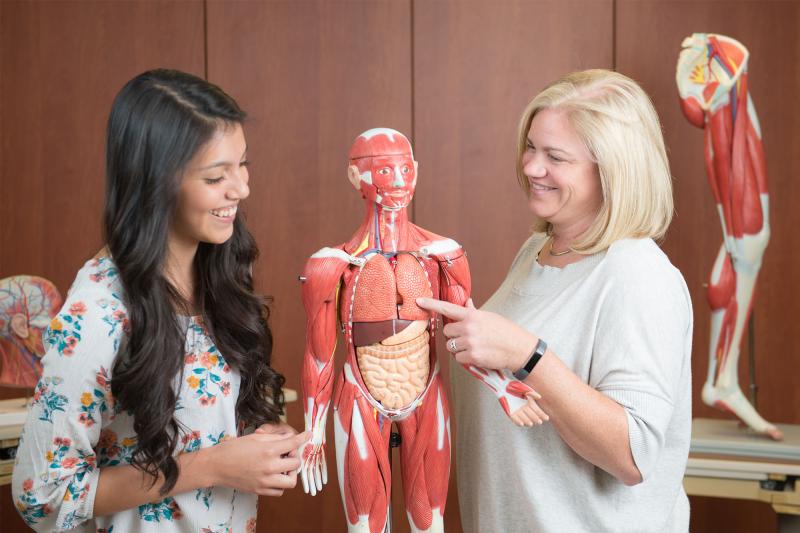- AdventHealth University

Are you passionate about health and wellness? Do you envision a career where you can make a real difference in people's lives? A Bachelor of Science (BS) in Health Sciences offers a versatile foundation for a range of health science jobs. It's designed for students like you who are eager to improve health outcomes, whether working directly with patients or contributing behind the scenes.
What Exactly Is Health Science?
Health science is a broad, interdisciplinary field focused on understanding health, preventing illness and promoting well-being for patients and in our communities. Unlike degrees that train for one specific clinical role, a health science program gives you an overarching view of the health care ecosystem. You’ll explore topics like:
- Disease processes and prevention
- Ethics and legal issues in health care
- Health care systems and delivery
- Health promotion and education
- Human anatomy and physiology
- Research methods
The broad perspectives covered in the program creates adaptable and prepared graduates, qualified for a variety of health science jobs.
Skills You'll Learn Through a Health Sciences Degree
Beyond specific health care knowledge, health science programs hone transferable skills necessary for success in any professional setting, particularly health care. As you progress through your program, you will develop:
- Communication skills: Clearly conveying information to diverse audiences, including patients, colleagues and community members
- Critical Thinking and Problem Solving: Analyzing complex health issues, evaluating evidence, and developing effective solutions
- Cultural Competency: Working effectively with patients from various backgrounds, respecting diverse beliefs and needs
- Ethical Reasoning: Navigating the complex moral dilemmas often encountered in health care settings with integrity
- Leadership and Teamwork: Collaborating effectively within health care teams and potentially leading initiatives or projects
- Research and Data Analysis: Understanding and applying research findings to inform practice and assess program effectiveness
These skills are highly valued by employers and open doors to numerous career opportunities in the health sciences.
What Jobs Can You Get with a Health Sciences Degree?
The beauty of a health sciences degree is in its flexibility, preparing you for various roles, some of which require direct patient interaction, while others focus on administration, education or technology.
Here are just a few examples of the careers in health science you can pursue with a Bachelor of Science in Health Sciences:
Health Education Specialist
Health Education Specialists empower patients and communities to adopt healthy behaviors. You'll design, implement and evaluate programs focused on preventing illness and promoting wellness through education.
Key Responsibilities:
- Advocating for health-promoting policies and environments
- Assessing community health needs related to specific topics (e.g. nutrition, chronic disease prevention, fitness)
- Connecting people with relevant health services and resources
- Developing educational materials like brochures, workshops and presentations
- Teaching health classes and facilitating workshops
Health Education Specialist Salary
According to the U.S. Bureau of Labor Statistics (BLS), the average annual salary for health education specialists in the U.S. is approximately $63,000. Please note that entry-level salaries may vary, and compensation can differ based on location, experience and employer.
Health Care Administrator or Coordinator
If you excel in organization, leadership and envisioning the bigger picture, a career in health care administration might be a good fit for you. Administrators and coordinators manage the business side of health care, ensuring facilities run smoothly and efficiently to support patient care.
Key Responsibilities:
- Coordinating staff schedules and managing human resources tasks
- Developing and implementing policies and procedures
- Ensuring compliance with health care laws and regulations
- Improving the efficiency and quality of health care services
- Managing budgets and financial performance
- Overseeing the daily operations of a department or facility
Health Care Administrator or Coordinator Salary
The BLS reports that the average annual salary for Medical and Health Services Managers (a broad category that includes administrators) in the U.S. is approximately $111,000. However, roles typically require experience, and management positions may necessitate a graduate degree. A BS in Health Sciences provides a strong foundation for entry-level administrative or coordinator positions, which can lead to higher-level management roles with experience and growth.
Patient Navigator/Advocate
Patient Navigators help patients navigate the complex health care system. You act as a guide and advocate, ensuring patients understand their diagnoses, treatment options, insurance coverage and can access the care and resources they need.
Key Responsibilities:
- Assisting patients in scheduling appointments and clarifying medical instructions
- Assisting with insurance forms, financial assistance applications and resolving billing issues
- Connecting patients with community resources (e.g., transportation, support groups)
- Educating patients about their rights and advocating for their needs
- Facilitating communication between patients and health care providers
Patient Navigator/Advocate Salary
According to ZipRecruiter, Patient Navigators/Advocates earned an average annual salary of about $43,000. Salaries can vary significantly based on the specific setting (hospital, clinic, non-profit) and responsibilities.
Health Information Technician/Specialist
For those interested in the intersection of health care, technology and data management, a career in health information management is a strong option. These professionals organize and manage health information data, ensuring its quality, accuracy, accessibility and security.
Key Responsibilities:
- Communicating with physicians and other health care professionals regarding patient information
- Ensuring accuracy and completeness of medical coding for billing purposes
- Organizing and maintaining patient records (often electronic health records — EHRs)
- Protecting patient confidentiality and ensuring data security compliance (HIPAA)
- Using software to analyze patient data for quality improvement or research
Health Information Technician/Specialist Salary
The average annual salary for Health Information Technologists and Medical Registrars was around $63,000, according to the BLS.
Foundation for Advanced Clinical Roles
Many health science jobs serve as excellent steppingstones toward advanced clinical practice. Your Bachelor of Science in Health Sciences can fulfill many prerequisites for graduate programs. The science foundation, understanding of healthcare systems, and critical thinking skills developed in your bachelor's program make you a strong candidate for graduate studies leading to specialized health science careers.
Example Careers:
- Clinical Research Coordinator: Assisting with clinical trials, managing data and ensuring regulatory compliance, this role builds on the research skills you developed during your Bachelor's program.
- Physical Therapy (PT), Occupational Therapy (OT) and Physician Assistant (PA) Studies: A Bachelor of Science (BS) in Health Sciences often covers the required science coursework for applying to these competitive graduate programs.
Take the Next Step in Your Health Sciences Career With AdventHealth University
AdventHealth University offers a distinctive learning environment rooted in the values of Nurture, Excellence, Spirituality, Stewardship,and Teamwork. Our Health Sciences programs (both Associate’s and Bachelor's levels) are designed to impart essential knowledge and to cultivate compassionate and skilled health care professionals ready to serve their communities. You'll learn from an experienced faculty within a health care-focused institution, gaining insights and connections that can shape your future health science career.
Learn more about AdventHealth University’s Associate of Science (AS) in Health Sciences and Bachelor of Science (BS) in Health Sciences programs. You can request information about any of our programs, and a member of our team will contact you to answer any questions you may have and help you get started earning your degree.


